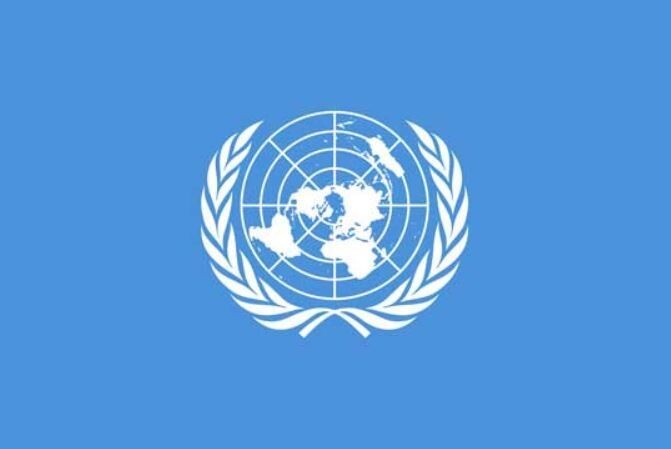hankyoreh
Links to other country sites 다른 나라 사이트 링크
N. Korea violated UN sanctions and developed nuclear weapons and missiles last year, UN report says

With the North Korea-US denuclearization talks in a stalemate, the North continued to develop its nuclear weapon and missile programs last year in violation of the UN Security Council’s sanctions resolutions, a UN report concludes.
Over the past few days, overseas media outlets have covered an annual report produced by a panel of experts working for the UN Security Council Sanctions Committee on North Korea. While North Korea halted nuclear weapons tests and intercontinental ballistic missile (ICBM) launch tests at the end of 2017, the report said, it has continued to build and maintain nuclear facilities and test launch projectiles designed using ballistic missile technology. The report covered the implementation of sanctions against North Korea and investigated whether those sanctions had been violated last year.
In connection with North Korea’s nuclear activities, the sanctions committee said that several UN member states have concluded that Pyongyang is still building a light-water nuclear reactor at its Yongbyon nuclear complex. Construction of new facilities in the vicinity of the light-water reactor and the dredging of the Kuryong River were captured in satellite imagery.
As for the missile program, the report said that Pyongyang has continued to improve its capabilities and develop its infrastructure. On 13 occasions between May 4 and Nov. 28 of last year, the North test launched at least 25 projectiles, including a new type of short-range ballistic missile (SRBM) and a submarine-launched ballistic missile (SLBM).
However, the report said there was no evidence that the 5MW nuclear reactor at Yongbyon has been operated since the end of 2018, marking the longest break in North Korea’s plutonium production thus far. Nor was any activity observed at the nuclear weapons test site at Punggye Village, which the North said it has dismantled.
According to sanctions resolutions, all North Korean workers earning foreign currency overseas were supposed to be repatriated to the North by Dec. 22, 2019, but the UN intends to continue investigating allegations that some of those workers remain overseas. The UN has raised the possibility that, in several cases, Pyongyang may have tried to avoid sanctions by transferring workers from their original country of residence to another country.
N. Korea’s earns foreign currency through overseas football players, sand and coal trading, cryptocurrency transactionsThe sanctions committee also regards a number of North Korean professional footballers playing in other countries (such as Han Kwang-song, with Qatar’s Al-Duhail club) as being in violation of sanctions. The contracts these footballers are on go beyond the deadline for repatriation of North Korean workers set by the UN Security Council.
In addition, the report estimated that North Korea earned US$500-600 million last year by selling sand and coal, both of which are banned under sanctions. This is the first time that sand exports have been detected.
The sanctions committee is also keeping a close eye on cryptocurrency, which it believes North Korea is using to earn foreign currency. It also said that the North imported as much as eight times more than its yearly limit of 500,000 barrels of refined petroleum products.
The sanctions committee believes that two Mercedes Maybach S600 automobiles reserved for Kim Jong-un’s personal use reached Pyongyang after a circuitous journey that passed through six countries over eight months. The UN has banned the export of automobiles into North Korea.
By Kim So-youn, staff reporter
Please direct comments or questions to [english@hani.co.kr]

Editorial・opinion
![[Editorial] Intensifying US-China rivalry means Seoul must address uncertainty with Beijing sooner than later [Editorial] Intensifying US-China rivalry means Seoul must address uncertainty with Beijing sooner than later](https://flexible.img.hani.co.kr/flexible/normal/500/300/imgdb/original/2024/0517/8117159322045222.jpg) [Editorial] Intensifying US-China rivalry means Seoul must address uncertainty with Beijing sooner than later
[Editorial] Intensifying US-China rivalry means Seoul must address uncertainty with Beijing sooner than later![[Column] When ‘fairness’ means hate and violence [Column] When ‘fairness’ means hate and violence](https://flexible.img.hani.co.kr/flexible/normal/500/300/imgdb/original/2024/0516/7417158465908824.jpg) [Column] When ‘fairness’ means hate and violence
[Column] When ‘fairness’ means hate and violence- [Editorial] Yoon must stop abusing authority to shield himself from investigation
- [Column] US troop withdrawal from Korea could be the Acheson Line all over
- [Column] How to win back readers who’ve turned to YouTube for news
- [Column] Welcome to the president’s pity party
- [Editorial] Korea must respond firmly to Japan’s attempt to usurp Line
- [Editorial] Transfers of prosecutors investigating Korea’s first lady send chilling message
- [Column] Will Seoul’s ties with Moscow really recover on their own?
- [Column] Samsung’s ‘lost decade’ and Lee Jae-yong’s mismatched chopsticks
Most viewed articles
- 1[Editorial] Transfers of prosecutors investigating Korea’s first lady send chilling message
- 2[Exclusive] Unearthed memo suggests Gwangju Uprising missing may have been cremated
- 3[Column] US troop withdrawal from Korea could be the Acheson Line all over
- 4[Column] When ‘fairness’ means hate and violence
- 5[Editorial] Intensifying US-China rivalry means Seoul must address uncertainty with Beijing sooner t
- 6‘Shot, stabbed, piled on a truck’: Mystery of missing dead at Gwangju Prison
- 7S. Korea “monitoring developments” after report of secret Chinese police station in Seoul
- 8China calls US tariffs ‘madness,’ warns of full-on trade conflict
- 9Seoul government announces comprehensive measures to prevent lonely deaths
- 10[Column] How to win back readers who’ve turned to YouTube for news